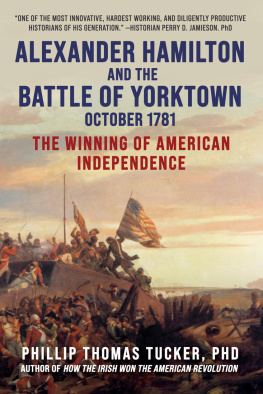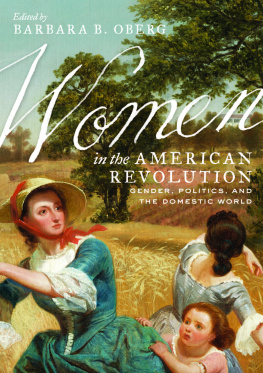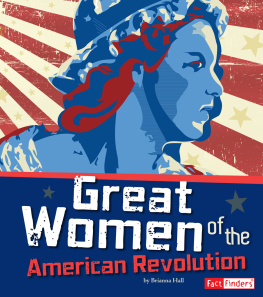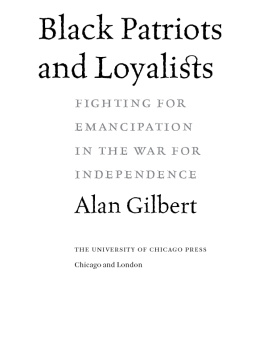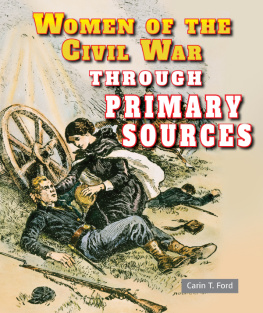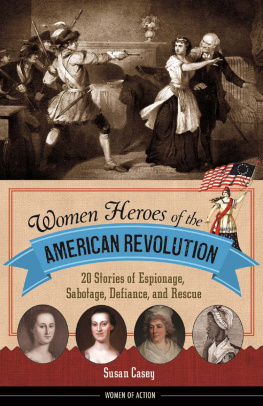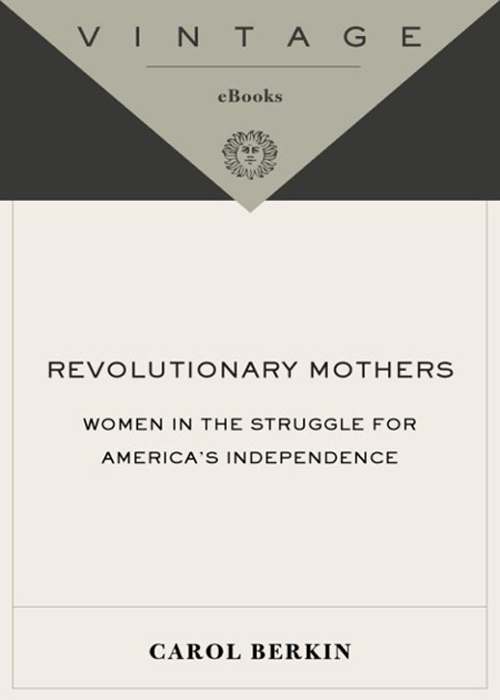
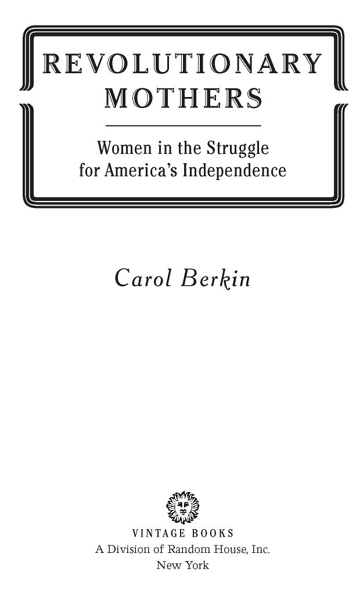
Table of Contents
For my brother, Mark Berkin,
and
my sister, Sylvia Berkin Rose
INTRODUCTION
CLIOS DAUGHTERS, LOST AND FOUND
For many Americans the Revolution is their last great romance with war. We read it as a story of noble generals, brave citizen-soldiers, dashing French noblemen, eloquent statesmen, and freedom-loving wives and daughters. In popular vignettes of the war, there are heroic commanders standing tall in rowboats, and lovely women busily stitching together the new American flag. The events leading to the Revolution seem to move as fast as light, leaping from Plymouth Rock to the Declaration of Independence to Yorktown, as if Americas straight trajectory to nationhood was preordained. Although the Revolution is acknowledged to be a war, it is both a quaint and harmless war, for there is much that is missing in the tales we tell: the violence on and off the battlefield, the families torn apart by political choices, the destruction of homes and crops, the cries of frightened children, the screams of women raped by soldiers, the weariness of a war-torn country, the sickly scent of death and dying in makeshift hospitals, the hunger, dislocation, and for many, both white colonists and Indians, the final exile from their homeland.
In an era of genocidal wars, terrorism, and heated debates over the meaning of patriotism, this romantic view of the American Revolution is especially appealing. But the men and women who lived through it have a very different story to tell, more complex, and, in the end, more relevant to us as their heirs and descendants. As colonists, these Americans were sharply divided on the question of independence. In many areas, the Revolution was a bitter civil war, pitting neighbor against neighbor, rich against poor, and race against race. It was also a brutal home-front war, waged by a largely agricultural society against the most powerful and well-trained military and naval force of the Western world. It was a long war, an eight-year war, begun even before a declaration of independence was signed and continuing, sporadically, after peace was declared. And when it was over, thousands of refugees left their homes, taking with them their skills, their labor, and their knowledge as well as what wealth they could preserve. In its wake it left widows and mourning mothers, disabled veterans, African Americans separated from their families, Indians in danger of losing their lands, a colossal war debt, pockets of economic depression, and a host of political problems that would not be addressed until the constitutional convention of 1787.
The Revolution also left much undone. The eighteenth-century embrace of freedom, liberty, and equality was not yet wide enough to encompass women, men without property, African Americans, or Indians. The limitations the founders of the nation placed upon equality were acts of conformity to the social views of the day as much as deliberate exclusions. For the men who led the country were products of a culture far different from our own, a hierarchical world of deference and obedience. Although they dared to challenge authority for themselves, they did so for specific and compelling political reasons. They did not see their defiance of the king as an invitation to open the floodgates to challenges based on race or gender. Although new ideas about human abilities and capacities, and about the organization of society, had begun to appear, most eighteenth-century Americans grew up in a world of fixed truths about the capacities of men and women, the character of rich and poor, the inherent virtues and shortcomings of white and black. The Revolution disturbed and occasionally reconfigured, but it did not fully dislodge the power of those truths. No sweeping social revolution followed in the wake of the political revolution; indeed, like women and men after many wars, white Americans seemed more eager to return to the life that had been disrupted than to create a new one. Fulfilling the Revolutions promise of equality became the task of the centuries that followed.
It is important to tell the story of the Revolution and its aftermath with the complexity it deserves. But it is also important to tell it as a story of both women and men. Too often the war for independence is portrayed as an exclusively male event, its cast of characters such familiar figures as Commander in Chief George Washington, the Swamp Fox Francis Marion, the Virginia orator Patrick Henry, the schoolteacher-turned-spy Nathan Hale, and the midnight rider Paul Revere. Only three women seem to be readily associated with the war for independence: Abigail Adams, who, it is said, requested that her husband and his fellow law-makers of the new nation remember the ladies and let them vote; Betsy Ross, who sewed the first United States flag; and Molly Pitcher, who carried water to the thirsty men defending Fort Monmouth. Alas, in all three cases, historical memory is faulty. Abigail Adams was not an early suffragist, demanding that John and the Congress grant women the right to vote. She was a dutiful, if politically informed wife, asking privately if her husband could do something to reform the horrendous laws of coverture that deprived married women of their property rights. Betsy Ross was not a humble seamstress but a skilled upholsterer, an artisan with a thriving trade, and although she may have sewn a flag, there is little evidence to prove it. Finally, Molly Pitcher simply did not exist. Like Rosie the Riveter of World War II fame, Molly Pitcher was a name given to the many women who carried water to cool down the cannons so that soldiers could reload and fire them again.
The gender amnesia that surrounds the American Revolution did not always exist. During the war, and in the early decades of the new nation, poets, pamphleteers, essayists, novelists, and many public leaders praised women for their participation in the struggle for independence, even as they debated what new demands, if any, the young republic ought to make upon female patriots and what demands these women could make on the new nation. The experiences of this revolutionary generation of women were kept fresh in the minds of later generations by women like Elizabeth Ellet, whose three-volume Women of theAmerican Revolution, published in 18481850, was based on letters, diaries, and recollections passed down from mother to daughter to granddaughters. Because of Ellet, antebellum womenand mencould thrill to stories of women who led boycotts against British goods, raised funds for the Continental Army, nursed wounded soldiers, spied on the enemy, and wrote propaganda to advance the patriot cause.
But if Ellets work honored the women of the revolution, it also transformed them, for her biographical sketches are premised on the nineteenth-century belief in womans inherent moral superiority, her natural piety, her maternal instincts, and her domestic role as the mistress of a haven from the heartless world of early industrializing society. In the romantic prose of her own era, Ellet recast eighteenth-century icons such as Abigail Adams and Martha Washington as models of a gentility and domesticity familiar to her readers. Abigail and Martha might not have recognized themselvesor each otherfrom the pages of Ellets books, but they would have been pleased to see that they remained in the publics memory.
Although many of Ellets subjects were elite women, there were a surprising number of frontier housewives so obscure that their first names are unknown, as well as young farm girls and soldiers wives. But rich or poor, most of the women who found a place in
Next page

